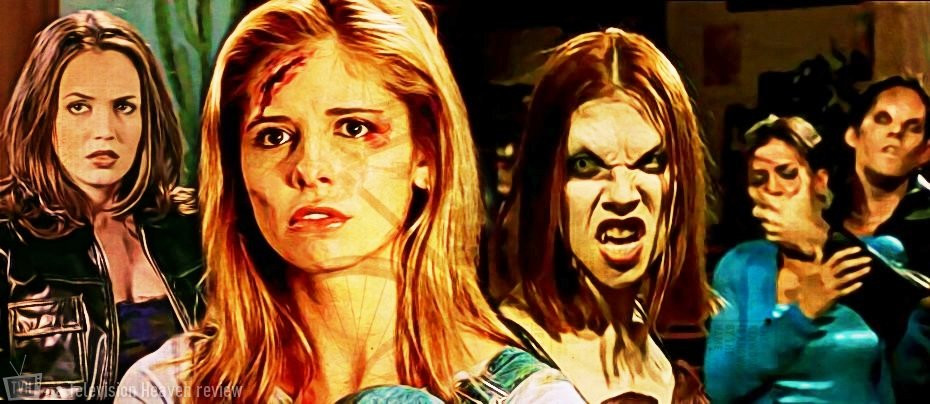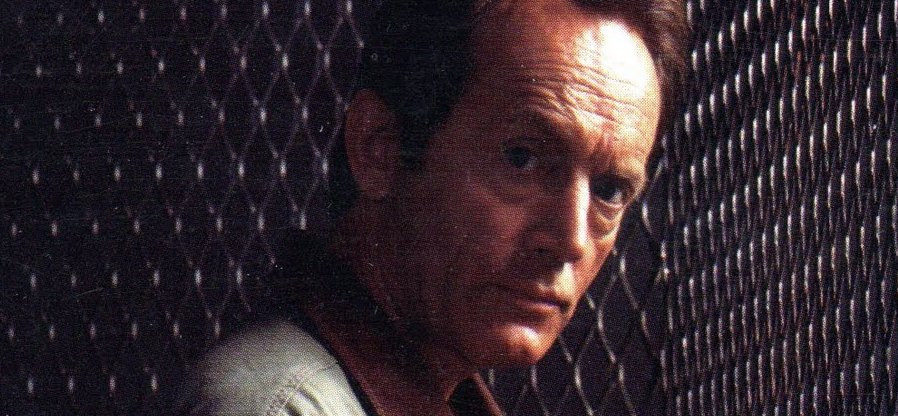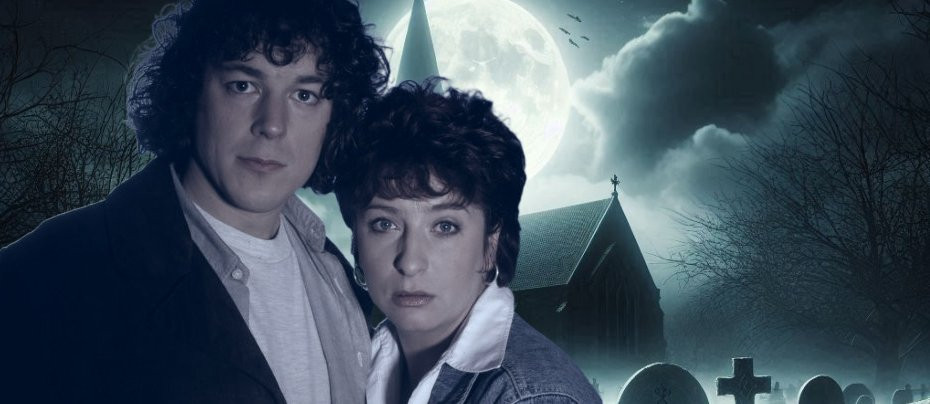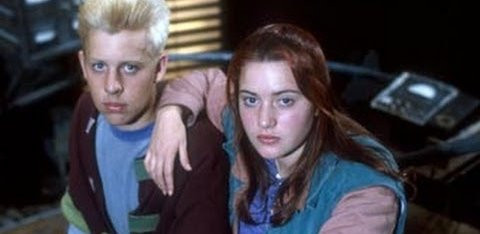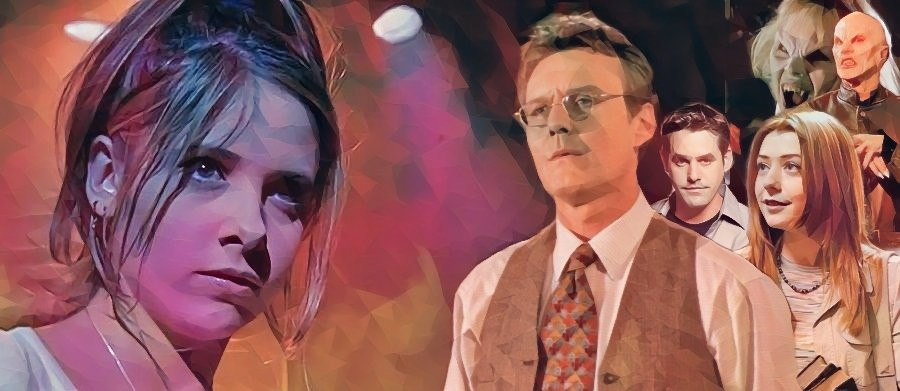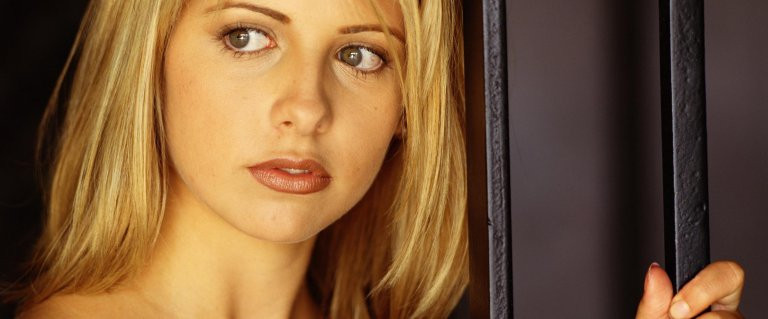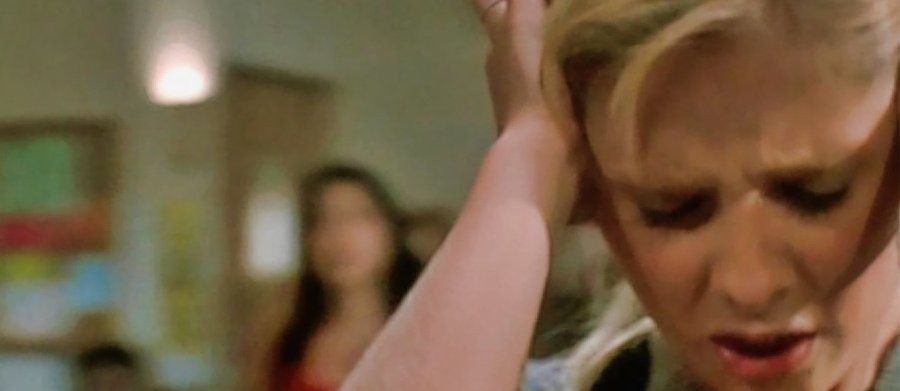
The Best Of...Buffy the Vampire Slayer - Earshot
A Personal View
By John Winterson Richards
This is about the definitive episode of 'Buffy the Vampire Slayer,' which is not necessarily the same as saying the best episode. Most of the serious contenders for Best Buffy are either "format breakers" like 'Once More With Feeling,' 'Tabula Rasa,' 'The Body,' and 'Hush,' or integral parts of Joss Whedon's trademark long story arcs, like 'The Gift' or 'Graduation Day - Part Two.' All are unusual, even for this show, and therefore cannot really be called definitive.

There is probably no such thing as a typical 'Buffy the Vampire Slayer' (let us just say BVS from this point). It was a show that thrived on innovation and defying expectations. However, there are quite a few episodes that contain all or most of the elements that define BVS and made it what it was.
Of these, 'Earshot' has been selected for three reasons. First, it is particularly good, well written and well played. Second, although, in true Joss Whedon style, it references earlier episodes, most notably 'Band Candy,' it is basically a freestanding story. This was to prove significant in its broadcast history.
Above all, it represents Peak Buffy, the glorious third season. It is axiomatic among BVS fans that the odd numbered seasons are the better ones. Since the first was, to an extent, still finding its way, and the fifth and seventh followed the show losing that way in the misjudged fourth, the third was when it was really on track. This is not to say there are no great episodes in other seasons - on the contrary, the best was yet to come - but none matched the third for consistency of quality and of theme.
That theme was growing up. The great strength of BVS was that it was never about just killing a "Monster of the Week." It remains one of the best evocations of that difficult, confusing, often traumatic journey in every modern life when a teenager is meant to progress from being little more than a child to a full member of what is supposed to be the adult community. The monsters are therefore really metaphors for the challenges of this time of life.
For most people, those challenges are at their most daunting during the later years of secondary education, when they feel particularly uncertain of their identities and their roles, so the basic theme of the show is at its clearest and strongest during the first three seasons, which together constitute Buffy: the High School Years.
There is therefore a double truth to the lines that - spoiler alert - sum up the spectacularly violent third season finale: "Guys, take a moment to deal with this. We survived." "It was a Hell of a battle." "Not the battle ...High School."
Even those of us whose schools were not physically destroyed by a giant demon monster can relate to that feeling of relief at the end of a tough rite of passage.
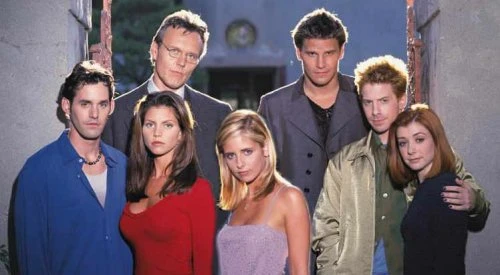
It was also during the third season that the cast was at its strongest. As well as the three principals, Sarah Michelle Gellar as Buffy, Alyson Hannigan as Willow, and Nicholas Brendon as Xander, and Anthony Stewart Head as their mentor Giles, the regular cast still included David Boreanaz as Angel, Charisma Carpenter as Cordelia, and Seth Green as Oz, who all three left it at the end of the season - Green for the big screen, and Boreanaz and Carpenter for 'Angel,'a "spin off" worthy of the original. The season's recurring cast also included Eliza Dushku as Faith, Emma Caulfield as Anya, Mercedes McNab as Harmony, Harry Groener as Mayor Wilkins, Armin Shimerman as Principal Snyder, Danny Strong as Jonathan, Kristine Sutherland as Buffy's Mum, and Alexis Denisof as Wesley. The last three appear in 'Earshot,' in which the last two are each given a great comic moment.

Danny Strong deserves his own digression. Now a very successful scriptwriter ('Recount,' 'The Butler,' 'The Hunger Games: Mockingjay,' 'Empire'), he had a very unusual career on BVS. He was actually in the initial unaired pilot, and Whedon, who is famously loyal to actors he likes, retained him as an occasional supporting character through the High School Years. He was also destined to return in a clever "format breaking" episode in the fourth season, then as a surprising antagonist in the sixth, and finally rather tragically in the seventh. In 'Earshot' he gives a powerful poignant performance that is probably his finest hour as an actor.
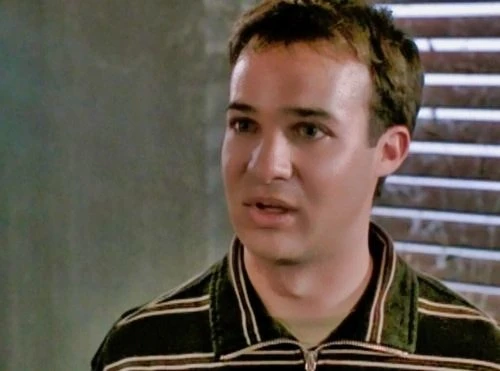
Yet the focus of the episode remains on Buffy herself, and it gives Gellar an opportunity to stretch her acting muscles a bit by being more than the traditional unstoppable action hero.

As if to show how much the monster is a McGuffin in BVS, the episode is not a quest to kill it which is achieved, against incredible odds and after much struggle, in the final act. On the contrary, the only one killed by Buffy is despatched quite casually in the opening moments. A second is killed later, but off screen and by another character. That is all the slaying there is in the episode. Almost everything else is talk - but it is still one of the most exciting episodes, as tension and suspense take over from action.
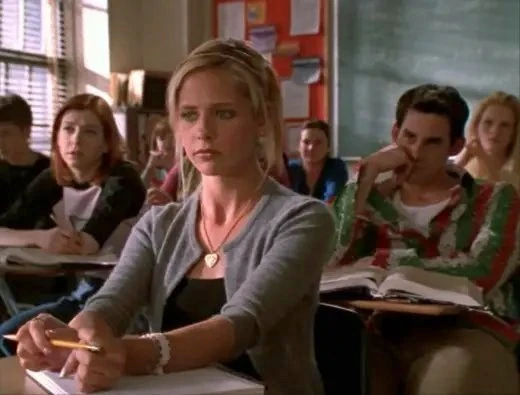
The real issue is that the blood of the dead monster gives Buffy the power to read the minds of others. At first she reacts with the glee of a young child with a new toy, and it is nice to see this side of her, because it is easy to forget that she is in many ways still a child and it sometimes seems unfair that her destiny had deprived her of the enjoyment of childish things usually associated with her age. Gellar conveys this with great charm.
However, she soon becomes a bit exasperated. Most of what she hears is very trivial and superficial, and High School boys in particular seem absolutely obsessed with one subject. This is, of course, entirely accurate.

Gradually, the situation becomes more serious. The noise in her head is constant. Amid the piles of trivia, she hears more and more suffering and despair. She begins to feel everyone's pain - quite literally. Exasperation turns into exhaustion, and there is a growing danger of insanity. This is a prospect far more terrifying than just being killed by a monster.
Gellar now shows us Buffy's vulnerability. This is a brave artistic choice. One cannot imagine a male action hero, or even an earlier female one like Xena, exposing their essential weakness in this way. Yet the truth is that a John Wayne, Clint Eastwood, or Arnold Schwarzenegger character would be just as frightened as her in such a position where all illusion of control is gone (Wayne came fairly close to admitting as much in 'The Shootist,' in which his fear of dying of cancer leads his character to suicide by gunfight). There is a real authenticity about Gellar's performance, and it is impossible not to sympathise, again remembering that Buffy is still basically a sick child.
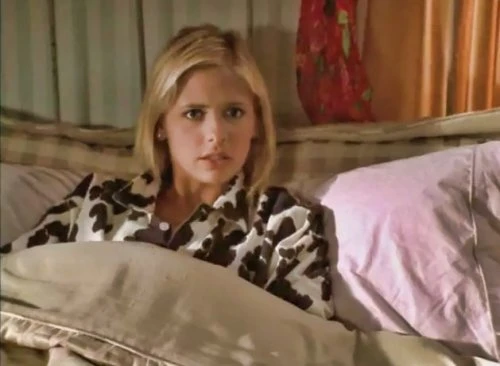
As Buffy is forced to take to her bed, we have the unusual dramatic situation of a hero marginalised in her own story, so her assistant heroes take must up the running for a while.
The scenario offers us the opportunity to take a look at the members of Buffy's support team, and their relationships with her, from a refreshingly different viewpoint. At first, as with Buffy's own initial reaction, this is comic. Wesley warns everyone that the thoughts they most want to hide will inevitably be the ones that come into their minds, so great mental discipline will be needed - and immediately begins to think lustfully about the underage Cordelia. Xander, typically, also finds that he cannot stop thinking about sex. Cordelia reveals that she really is as shallow and self obsessed as she appears: whatever she thinks comes out of her mouth immediately without any editing. Oz, by contrast, shows his depth with a Cartesian inner monologue on what Buffy's new ability might mean about the nature of reality - even if what his "Cogito Ergo Buffy" is not quite in accord with Descartes. Only Angel, the one person whose true feelings Buffy wants to know, remains totally unreadable.
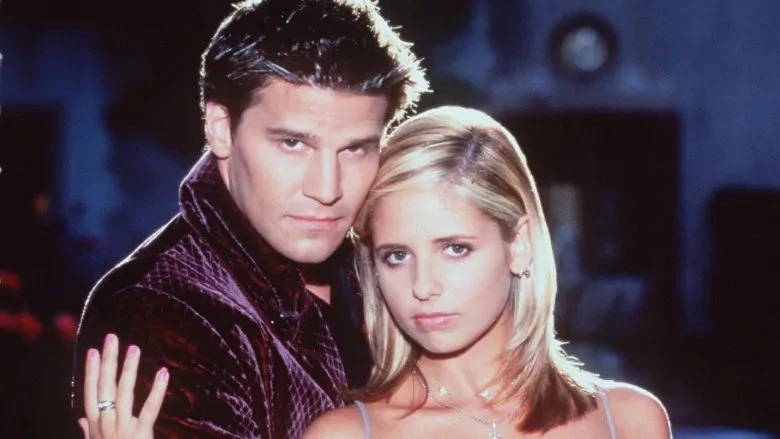
Yet the more serious and more negative consequences to her social network, as well as to her mental health, soon become apparent. Far from bringing her closer to the people on whom she relies, Buffy's mind reading prompts them to distance herself from her. Even her mother wants to get out of her room to prevent her finding out an embarrassing secret. Although the scene is played successfully for laughs, there is something rather disturbing about a mother distancing herself from her sick daughter at the very moment when she most needs her love.
This builds on another theme that has already been well established, both in this episode and previously throughout the series, the ultimate loneliness of Buffy's position as the "Chosen One." Much as her friends might help her on occasion, they can only help her - they cannot be her. She alone is the Slayer and there are often times when she must bear her responsibilities on her own.
Of course, the script cannot simply leave her like that, isolated and helpless. She is duly cured by one of her friends - a rare example in BVS of the feminist role model being saved by a man - and up on her feet for the final act.
By this point, the plot has taken a very different turn. While she had her mind reading powers, Buffy heard an unknown voice planning to kill everyone in the school.
This leads her to a direct confrontation with an adversary with the ability to kill her very easily: at one point, he literally holds her life in his hands, something else which is very unusual in BVS, which likes to portray its protagonist as being able to take control in any situation. Yet this is not the usual final duel. Instead of fighting, Buffy talks.

She draws on her own experiences, especially what she has heard recently through her mind reading, to tell some brutally honest truths about the human condition, especially the loneliness and desperation of teenagers. It is a perceptive and moving speech, and in delivering it, Gellar again gives us another aspect of Buffy completely at odds with the traditional action hero.
She becomes almost saint-like, risking her own life in order to persuade rather than use violence, and relying on the power of truth alone, which does indeed prevail. That it does is credible thanks to Gellar's performance and the writing of Jane Espenson.
How much is Whedon and how much is Espenson only they can say. Espenson is one of Whedon's most frequent and trusted collaborators. She has obviously learnt a great deal from him, but she also has an astonishing list of credits in her own right, including 'Warehouse 13,''Star Trek: Deep Space Nine,' 'Tru Calling,' 'Battlestar Galactica,' 'Once Upon A Time,' 'Jessica Jones,' and 'Torchwood: Miracle Day,' as well as Whedon's BVS, 'Angel,' 'Firefly,' and 'Dollhouse.'She is arguably the most accomplished female scriptwriter in the fantasy and science fiction genre since the legendary Dorothy Fontana in the original 'Star Trek,'and the feminine sensibility she brings to 'Earshot' gives it its heart.
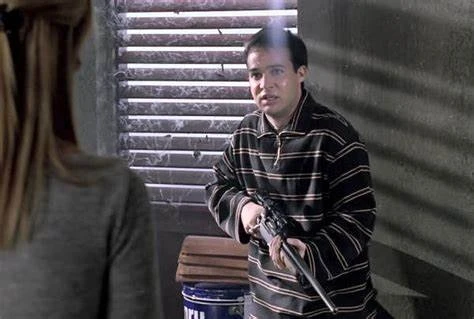
It is therefore ironic that this most emotionally literate of BVS episodes turned out to be one of the controversial.
A week before it was first due to be broadcast, thirteen people were murdered by two very troubled teenagers at a High School in Columbine, Colorado on 20th April, 1999. The plot point of a potential massacre at a High School therefore became both very prescient and very sensitive.
More than that, the discussion of the issue by sympathetic characters is a good example of the much praised authentic dialogue pioneered by Whedon and BVS, and for that reason not what anyone wanted to hear at that point. Teenagers want to seem cool, so they try to sound erudite and witty at all times. In some situations, this can come across as a bit callous. Teenagers are not good at judging these things, nor are they good at expressing their true emotions honestly - a point well made in 'Earshot.' The flip lines about school shootings are therefore probably an accurate reflection of the sort of thing teenagers would have been saying at the time - but among themselves, not on broadcast television.
Under the circumstances, it was no surprise that the episode was "bumped" and aired, out of sequence, a few months later. This was possible only because it was a freestanding episode with nothing essential to the story arc of the season as a whole. Otherwise, showing the whole season would have to have been postponed.
Twenty years on, the surprise is that it was shown at all. In these more sensitive - perhaps oversensitive - times, the episode would probably have been junked, or at the very least the "offensive" lines would have been cut, doubtless to a chorus of insincere corporate apologies.
That would be a cultural crime. The episode is an important statement about the casual brutality of human beings towards each other, and those lines are part of its truth.
Indeed, one cannot help but wonder what might have happened if those two messed up children in adult bodies at Columbine had waited a couple of weeks and seen 'Earshot' in between. Perhaps they might have seen part of themselves in it. Perhaps they would have realised the truth of its message that practically everyone is hiding the sort of pain they found so unbearable, especially in their teenage years. Perhaps it might have at least prompted them to pause and think a bit more. Perhaps...
Or perhaps BVS is right that there is such a thing as Evil, capital E, and some people choose to give into it.
Either way, the episode remains, as does 'Buffy the Vampire Slayer' as a whole, a permanent message of hope to all teenagers: you are not alone; everyone feels as you do; things do get better; you can beat the monsters.
About the writer of this review:
John Winterson Richards is the author of the 'Xenophobe's Guide to the Welsh'and the 'Bluffer's Guide to Small Business,' both of which have been reprinted more than twenty times in English and translated into several other languages. He was editor of the latest Bluffer's Guide to Management and, as a freelance writer, has had over 500 commissioned articles published.
He is also the author of ‘How to Build Your Own Pyramid: A Practical Guide to Organisational Structures' and co-author of 'The Context of Christ: the History and Politics of Rome and Judea, 100 BC - 33 AD,' as well as the author of several novels under the name Charles Cromwell, all of which can be downloaded from Amazon. John has also written over 100 reviews for Television Heaven.
John's Website can be found by clicking here: John Winterson Richards
Books by John Winterson Richards:
Published on October 22nd, 2020. Written by John Winterson Richards for Television Heaven.


